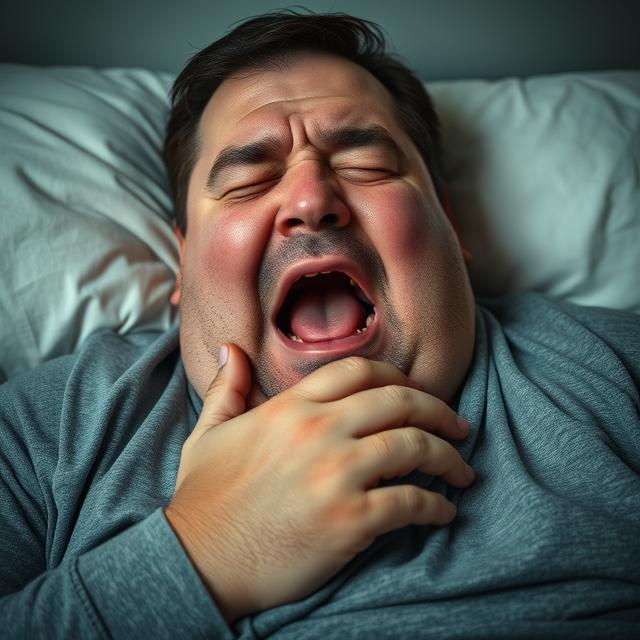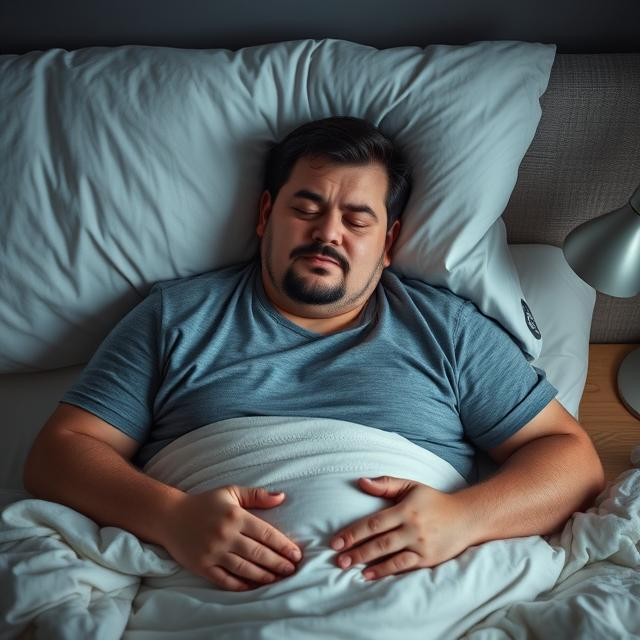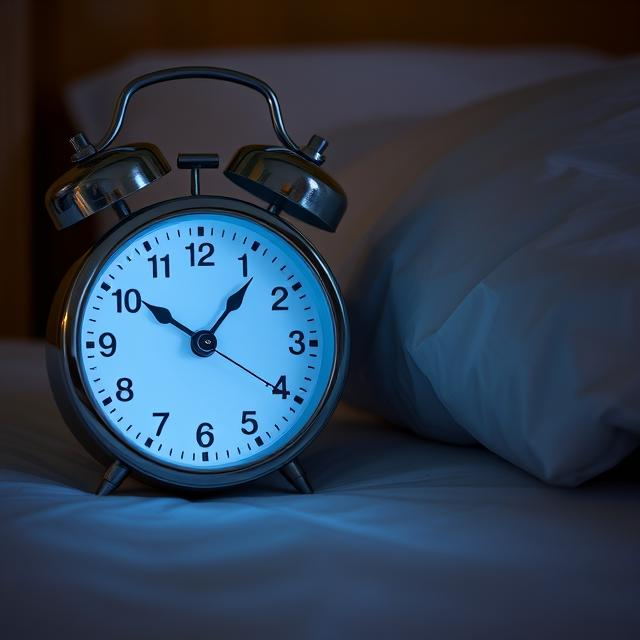
Can Sleep Apnea Cause Weight Gain? The Overlooked Reason You’re Not Losing Fat

Can Sleep Apnea Cause Weight Gain? The Overlooked Reason You’re Not Losing Fat
If you’ve been trying to lose weight but feel like nothing’s working, sleep apnea might be the reason. Most people think it’s just about snoring, but sleep apnea and weight gain are closely connected in ways that often get ignored. This condition can wreck your sleep quality and throw off your entire metabolism—even if you’re eating clean and moving regularly.
Sleep apnea happens when your breathing stops and starts while you sleep. These interruptions might not fully wake you, but they keep your body from getting into the deep rest it needs. When your sleep is disrupted night after night, your hormones, energy, and hunger signals get out of balance. That’s when weight gain from poor sleep starts creeping in.
What Is Sleep Apnea and Why It’s More Than Just Snoring
We help people at FITSCRIPT uncover hidden roadblocks like this. If your sleep is broken, your weight loss will be too. It doesn’t matter how clean your diet is—if you’re not sleeping right, your metabolism can’t reset and burn fat like it should.
Signs Your Weight Gain Might Be Linked to Sleep Apnea
Here are a few red flags that point to sleep apnea and weight gain being connected:
- You feel exhausted in the morning, even after 7–8 hours in bed
- You snore loudly or stop breathing during sleep (ask a partner)
- You rely on caffeine just to get through the day
- You’ve gained weight around your midsection without changing your diet
- Your workouts feel harder, and recovery is slower than it should be
This isn’t just about being tired. It’s about your body not being able to burn fat and regulate appetite properly because of disrupted sleep. At FITSCRIPT, we guide people through tracking and fixing these patterns so fat loss becomes possible again.
If your body feels stuck, it’s time to look at what’s happening while you sleep. Get started with us to build a plan that restores your energy, balances your hormones, and finally breaks through that plateau.
How Interrupted Sleep Sabotages Your Metabolism
When sleep apnea interferes with your rest, it directly slows your metabolism. If your body can’t complete its natural sleep cycles, it doesn’t just leave you tired—it causes weight gain by throwing off the systems that manage fat burning and energy use. That’s why sleep apnea and weight gain often show up together, even when diet and exercise seem “good enough.”
Your metabolism resets and repairs while you sleep. If you’re waking up multiple times per night due to sleep apnea, your body never finishes that reset. Hormones like leptin and ghrelin—responsible for hunger and fullness—go out of balance. So you wake up hungrier, with more cravings, and less willpower to resist. That’s a recipe for slow, steady weight gain from poor sleep.
At FITSCRIPT, we’ve seen this happen over and over again. People work hard all day, eat clean, and train consistently, but if their sleep is off, nothing changes. Once they fix their sleep, the weight finally starts to come off.
How Poor Sleep Slows Fat Loss
Here’s what happens when your sleep is constantly disrupted by apnea:
- Your cortisol levels stay high, which signals your body to store fat
- Your body craves quick-energy foods, usually sugar and carbs
- You lose motivation to move because you’re always tired
- Your metabolism slows down to conserve energy
- Your blood sugar stays elevated longer, increasing fat storage
These factors build up over time. You may not notice the weight gain at first, but eventually, it feels impossible to lose. We help people break this cycle at FITSCRIPT by giving them the tools to recover their energy, improve sleep, and reset their fat-burning system.
If your efforts haven’t been working and you suspect sleep is the missing piece, get started with us. We’ll help you put all the pieces together in a way that makes your body work with you, not against you.
The Link Between Sleep Deprivation and Hormonal Weight Gain
Sleep apnea doesn’t just make you tired—it changes your hormones in a way that encourages fat gain. If you’re experiencing weight gain from poor sleep, it’s not just because you’re too tired to work out. It’s because your hormones are pushing your body to store fat, especially around your belly. This is why sleep apnea and weight gain are so frustrating—your body is doing the exact opposite of what you want.
When your body is sleep-deprived, it produces more cortisol. This stress hormone tells your body to hold on to fat for safety. At the same time, your hunger hormone ghrelin goes up, and your fullness hormone leptin goes down. That combo leads to stronger cravings and a bigger appetite—usually for sugar and fast carbs. It’s not a willpower problem. It’s biology.
At FITSCRIPT, we help people reset these hormonal patterns naturally. Once you balance your sleep, your hunger starts to regulate, your cravings calm down, and your body starts letting go of stored fat.
What Hormonal Imbalances Happen With Sleep Apnea?
If you’re dealing with sleep apnea and weight gain, watch out for these patterns:
- Cortisol stays high and blocks fat loss
- Ghrelin spikes, making you feel hungrier
- Leptin drops, so you never feel full
- Insulin sensitivity goes down, so your body stores more sugar as fat
- Testosterone and growth hormone may drop, reducing lean muscle mass
This combination leads to weight gain even if you’re eating clean and trying to stay active. It makes everything harder. But once you restore deep sleep, those hormones reset. Your body can start burning fat again—especially the fat it’s been clinging to the longest.
We work with people inside FITSCRIPT to stop this cycle at the root. If you’re done guessing and ready to finally feel your body working for you again, get started now. You don’t have to live in a plateau forever. Better sleep might be the key you’ve been missing.
Cortisol, Cravings, and Insulin Resistance Explained
If you're gaining weight and feel like you're doing everything right, sleep apnea might be the hidden reason. One of the biggest links between sleep apnea and weight gain is how it disrupts your hormones—especially cortisol and insulin. These two are powerful. When they’re out of balance, they cause cravings, slow your metabolism, and lead to fat storage—especially around your belly.

Sleep apnea and weight gain are connected because disrupted sleep spikes cortisol. This stress hormone keeps your body in “fight or flight” mode, which makes it hold onto fat. At the same time, your body becomes more resistant to insulin. That means your blood sugar stays high longer, and instead of using that sugar for energy, your body stores it as fat.
At FITSCRIPT, we see this often. Someone eats clean, exercises, and still gains weight. But their cortisol is elevated, and their insulin isn’t working efficiently—all because their sleep is broken. Once we help them fix their sleep, their cravings drop and their fat loss kicks in again.
What Happens to Hormones When You Don’t Sleep
Here’s what makes sleep apnea and weight gain such a frustrating combo:
- High cortisol raises blood sugar and signals fat storage
- More cravings for sugar and salty foods increase calorie intake
- Insulin resistance makes your body store fat instead of burning it
- Disrupted hormones throw off hunger cues, so you eat more without feeling full
- This cycle repeats nightly, creating steady fat gain even without overeating
If you’re dealing with stubborn fat, especially in the belly, and waking up feeling tired, these hormonal shifts are likely in play. We work with people at FITSCRIPT to reduce stress, balance blood sugar, and reset these hormones naturally—starting with better sleep.
If you’re ready to stop fighting your own biology and finally see progress, get started with us. You’ll learn how to manage cravings and reverse weight gain from poor sleep by working with your hormones, not against them.
Why You Might Gain Weight Even While Eating Clean
It’s frustrating. You eat clean, count calories, maybe even log your meals—and the scale won’t move. This is where sleep apnea and weight gain start to really show their impact. If you’re gaining weight from poor sleep, your clean eating might not be enough. Sleep affects how your body responds to food, no matter how “healthy” that food is.
When your sleep is poor, your metabolism slows down and your body holds onto fat. It’s not just about how much you eat, but how your body processes it. You could be eating grilled chicken and vegetables, but if your hormones are out of sync from sleep apnea, your body won’t burn that food the way it should.

At FITSCRIPT, we work with people who are doing all the right things but still gaining weight. Once we look at their sleep, it becomes clear what’s happening. When we help them sleep better, their body starts to respond like it should—burning fat, regulating hunger, and finally dropping the weight.
Why Clean Eating Isn’t Always Enough
If you're asking does sleep apnea cause weight gain, here’s why your clean eating might not be working:
- Poor sleep affects how your body stores and uses calories
- Insulin resistance causes fat storage even from healthy carbs
- Cortisol from sleep apnea pushes your body into “storage mode”
- Cravings still sneak in, leading to nighttime snacking or overeating
- Low energy means fewer daily steps and slower calorie burn
You’re not failing—your body just isn’t recovering. And without recovery, you can’t burn fat effectively. At FITSCRIPT, we guide people to fix their sleep, not just their food. When both work together, the fat finally starts to drop.
If you're tired of guessing why your weight won’t budge, get started with us. You deserve to see results from your hard work—and we’ll help you get there by addressing the real cause.
Sleep Apnea Treatment Options That Support Fat Loss
If you’re dealing with weight gain from poor sleep, treating your sleep apnea is the first step to turning things around. Once your sleep improves, your hormones reset, cravings calm down, and your body can finally burn fat again. That’s why sleep apnea and weight gain must be treated together—not separately.
You don’t need to figure this out alone. There are effective, proven treatments for sleep apnea that support weight loss. Whether it’s a CPAP machine, oral appliance, weight loss support, or positional therapy, there are solutions that can help you breathe better, sleep deeper, and finally start burning fat again.
At FITSCRIPT, we help people find the sleep support that fits their life. We don’t push one option. Instead, we help you find what works and build the routines that support it, so the benefits stick long-term.
Sleep Apnea Treatments That Can Support Weight Loss
Here are some of the most effective ways to treat sleep apnea and support fat loss:
- CPAP therapy to keep airways open and reduce breathing interruptions
- Oral devices that adjust your jaw and help prevent airway collapse
- Positional therapy to avoid back-sleeping, which worsens symptoms
- Weight management programs focused on sustainable fat loss
- Sleep hygiene improvements like consistent sleep schedules and tech-free nights
When you sleep better, you feel better. You move more, eat better, and your body burns more fat naturally. At FITSCRIPT, we combine treatment with lifestyle habits that make real change stick.
If you're ready to stop guessing and start solving the real issue behind your stalled progress, get started with us. We’ll help you restore your sleep, reset your metabolism, and finally get the results you’ve been chasing.
Table Of Contents
Unlock your full potential through advanced training protocols
Table Of Contents
YOU MAY ALSO LIKE THESE BLOGS

24/7 Support: Staying Accountable Between Workouts
Get 24/7 support for your goals with fitness accountability for men. Stay consistent with round-the-clock health coaching and real-time progress tracking built for success.

Why Weekly Q&A’s Accelerate Your Health Journey
Find out how weekly health coaching Q&A sessions offer expert support for men’s wellness and provide ongoing fitness guidance that keeps you on track to your goals.

Longevity Training: Beyond Cardio & Weights
Go beyond the basics with longevity training for men. Use advanced men’s fitness techniques and wellness longevity protocols to improve strength, energy, and recovery.
.png)
.png)
.png)
.png)
frequently asked questions
Can sleep apnea actually lead to weight gain over time?
Yes, disrupted sleep affects your metabolism and hunger hormones. FITSCRIPT helps address the root of weight gain from poor sleep with structured recovery and lifestyle strategies.
Why do I keep gaining weight even though I eat healthy and exercise?
If you're not sleeping well, that may be the cause. FITSCRIPT identifies patterns tied to sleep apnea and weight gain and helps you correct them.
Does sleep apnea affect how my body burns calories?
It can slow metabolism significantly. FITSCRIPT offers tailored routines to help restore balance and reduce weight gain from poor sleep.
What’s the link between poor sleep and late-night cravings?
Sleep loss disrupts appetite hormones like ghrelin and leptin. FITSCRIPT includes daily sleep tracking to help you reduce the triggers for nighttime snacking.
Can treating sleep apnea help with weight loss?
Yes, it often kick-starts better metabolism. FITSCRIPT reinforces those changes with nutrition and activity adjustments designed to help reverse sleep apnea and weight gain.
Why does poor sleep make it harder to stay active?
Lack of sleep reduces motivation and energy. FITSCRIPT designs low-impact movement plans that fit around fatigue and build momentum back up.
Is weight gain from poor sleep mostly fat or water retention?
Mostly fat, due to hormonal changes and slower metabolism. FITSCRIPT helps you target both with recovery-first fitness tools.
Can snoring alone cause weight gain or does it have to be sleep apnea?
Snoring can be a sign of apnea. FITSCRIPT encourages users to track symptoms and prioritize sleep quality to avoid compounding weight gain from poor sleep.
How do I know if my weight issues are tied to sleep apnea?
Symptoms like daytime fatigue, gasping at night, and unexplained weight gain are clues. FITSCRIPT helps you recognize patterns and take action.
What can I do to manage sleep apnea and weight gain effectively?
FITSCRIPT uses lifestyle coaching, daily routines, and recovery strategies to help improve sleep and reduce weight gain from poor sleep long-term.
Can using a CPAP machine help me lose weight?
It can improve sleep, which helps regulate hunger and metabolism—but it works best when combined with healthy habits.
Is weight gain from poor sleep harder to reverse than regular weight gain?
It can be if sleep is never addressed. Once you improve sleep, weight loss often becomes easier.
Why does sleep apnea make my belly fat more stubborn?
Cortisol from sleep disruption encourages fat storage in the midsection.
Will fixing my sleep alone help me lose weight, or do I still need diet changes?
Sleep is a key piece, but results come faster when paired with calorie control and hydration.
Should I get tested for sleep apnea if I keep gaining weight despite dieting?
Yes, unexplained weight gain and fatigue are strong reasons to get evaluated for sleep issues.
.webp)


